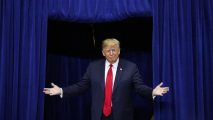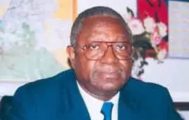Categories
Recent Posts
- World Bank increases funding to Cameroon by 21%
- Ukraine: Trump blames Zelensky for starting war after massive Russian attack
- Minister Obi Eta Jerome’s death – What do we know?
- Pope Francis transfers Cameroonian-born Nigerian Apostolic Nuncio in Sri Lanka to Ethiopia
- CDC banana exports hit 10,400 tons in Q1 2025
Archives
- April 2025
- March 2025
- February 2025
- January 2025
- December 2024
- November 2024
- October 2024
- September 2024
- August 2024
- July 2024
- June 2024
- May 2024
- April 2024
- March 2024
- February 2024
- January 2024
- December 2023
- November 2023
- October 2023
- September 2023
- August 2023
- July 2023
- June 2023
- May 2023
- April 2023
- March 2023
- February 2023
- January 2023
- December 2022
- November 2022
- October 2022
- September 2022
- August 2022
- July 2022
- June 2022
- May 2022
- April 2022
- March 2022
- February 2022
- January 2022
- December 2021
- November 2021
- October 2021
- September 2021
- August 2021
- July 2021
- June 2021
- May 2021
- April 2021
- March 2021
- February 2021
- January 2021
- December 2020
- November 2020
- October 2020
- September 2020
- August 2020
- July 2020
- June 2020
- May 2020
- April 2020
- March 2020
- February 2020
- January 2020
- December 2019
- November 2019
- October 2019
- September 2019
- August 2019
- July 2019
- June 2019
- May 2019
- April 2019
- March 2019
- February 2019
- January 2019
- December 2018
- November 2018
- October 2018
- September 2018
- August 2018
- July 2018
- June 2018
- May 2018
- April 2018
- March 2018
- February 2018
- January 2018
- December 2017
- November 2017
- October 2017
- September 2017
- August 2017
- July 2017
- June 2017
- May 2017
- April 2017
- March 2017
- February 2017
- January 2017
- December 2016
- November 2016
- October 2016
- September 2016
- August 2016
- July 2016
- June 2016
Featured
 Burkina Faso: Where vision meets discipline
Burkina Faso: Where vision meets discipline  Prosecution of journalists in Cameroon: European Parliament says enough red flags have been ignored
Prosecution of journalists in Cameroon: European Parliament says enough red flags have been ignored  1982-2025: How long will Biya hang on?
1982-2025: How long will Biya hang on?  How Biya and Archbishop Nkea protected the sanctity of the family in Cameroon
How Biya and Archbishop Nkea protected the sanctity of the family in Cameroon  October Presidential Election: Will 92-year-old Biya be re-elected?
October Presidential Election: Will 92-year-old Biya be re-elected?
Most Commented Posts
 4 Anglophone detainees killed in Yaounde
4 Anglophone detainees killed in Yaounde
18 comments Chantal Biya says she will return to Cameroon if General Ivo Yenwo, Martin Belinga Eboutou and Ferdinand Ngoh Ngoh are sacked
Chantal Biya says she will return to Cameroon if General Ivo Yenwo, Martin Belinga Eboutou and Ferdinand Ngoh Ngoh are sacked
13 comments The Anglophone Problem – When Facts don’t Lie
The Anglophone Problem – When Facts don’t Lie
12 comments Anglophone Nationalism: Barrister Eyambe says “hidden plans are at work”
Anglophone Nationalism: Barrister Eyambe says “hidden plans are at work”
12 comments Largest wave of arrest by BIR in Bamenda
Largest wave of arrest by BIR in Bamenda
10 comments
Latest Tweets
Featured
-

World Bank increases funding to Cameroon by 21%
-

Ukraine: Trump blames Zelensky for starting war after massive Russian attack
-

Minister Obi Eta Jerome’s death – What do we know?
-

Pope Francis transfers Cameroonian-born Nigerian Apostolic Nuncio in Sri Lanka to Ethiopia
-

CDC banana exports hit 10,400 tons in Q1 2025
-

Algeria to expel 12 French embassy officials
-

US: 7 900 Cameroonians face deportation
© Cameroon Concord News 2025
10, November 2018
Ambazonia War of Independence: Tearing apart political union cracks with La Republique 0
by soter • Editorial, Headline News
In Cameroon, government actions are cloaked in mystery and shrouded in secrecy. It can be difficult to parse rumors from truth, inconsequential events from those of significance, facts from fiction. In 2018 alone, President Biya postponed parliamentary elections to 2019, appointed 70 of 100 total senators, and has now officially been declared the winner of the October 7 presidential election. The presidential election, though, was like something cooked up in a Hollywood writers’ room. At one-point, President Biya announced the election date via his twitter handle, shocking domestic and international communities. Next, though no formal Cameroon People’s Democratic Movement (CPDM) party congress was convened, and no candidate was officially designated (as required in the party charter),Biya declared that he would run in the elections. Then, he snubbed the electorate. He did not campaign as a candidate for the highest office in the country. He staged one 20-minute rally in the Far North region, and that was it.
A more striking incident passed by unnoticed. Biya and other opposition candidates did not campaign in the Anglophone regions of the country, the North West and South West. Only Akere Muna of the Popular Front for Development Party visited, and he only went to Limbe, a French dominated city in the South West Region. The fact that Presidential aspirants, including Biya, avoided the Anglophone regions sends an unmistakable message to the international community – Ambazonia is a new country in the making.
What scared Biya and the other candidates away from Ambazonia? Earlier in the year, Ambazonian Restoration Forces attacked the Minister of Defence’s convoy in the South West Region. This attack suggests that the seed of freedom has been planted in the hearts of Ambazonians that All-Or-Nothing Law now applies—we live free forever or we all die today. Of course, only one is true—we live free forever. The Cameroon military cannot kill the 8-million Ambazonians that it would take to end the Ambazonia freedom struggle. Even if Biya’s soldiers were able to kill all 5-million Ambazonians living within Ambazonia territory, the 3-million Ambazonians in the Diaspora would fight on like Israelites until they reclaimed their God given birth-land.
The Interim Government of Ambazonia, currently in exile, is steadily establishing institutional structures that would enable United Nations (U.N.) Member States to politically recognize Ambazonia as an independent and sovereign state. This could be a significant development in the Ambazonia war of independence. U.N.Member States would bring the Ambazonia case before the appropriate U.N.Committees for deliberation and decision.
Supporters of the Ambazonia independence struggle within the African Union and European Union see Biya and his tribal oligarchs as responsible for massive tax evasion and significant non-performing loans, and many understand that people’s standard of living now is considerably worse than in the pre-Biya era. Moreover, the 1961 U.N. decolonization process for British Southern Cameroons remains incomplete; although French Cameroun and Southern British Cameroons entered into a confederacy union of equal partners, for over half a century the successive governments of French Cameroun have systematically eroded the founding norms of the union such. The French Cameroun governments have changed the constitution, adopted a despotic rule, and oppressed the Anglophone minority.
The long list of institutional abuses and usurpation of the fundamental rights of the people of Ambazonia reached a breaking point in 2016 when government forces brutally cracked down on peacefully protesting lawyers, teachers and students. The die was cast in November 2017 when President Biya declared war against the unarmed people of Ambazonia for exercising their right to ensure their future security by declaring independence. Together, these developments have triggered decolonization experts and relevant stakeholder governments to re-examine the UN-plebiscite policies that encouraged two separate UN territories — English West Cameroon (then Southern Cameroons and now Ambazonia) and French East Cameroun (La Republique du Cameroun)—which would co-exist under a federal system of governance. The Biya government, though, is bent on assimilating an entire neighbouring country of people who have their own distinct identity and culture.
The evidence speaks for itself. After the people of Ambazonia declared independence on October 1 of 2017, Biya’s government responded to peaceful protests with barbaric methods of suppression, including murder, rape, executions, assassinations, kidnap, torture, and dehumanizing treatment. Biya’s presidential win, as declared by the Constitutional Council, has proven that countries cannot be forced to unite and coexist in the absence of democratic institutions, shared values, and economic and political freedoms. Two countries with irreconcilable differences cannot exist peacefully in an oppressive political union. Indeed, the fiasco of the presidential election has proven that restoration of Ambazonia independence is right, legitimate, and practicable against the Biya-loyalist propaganda of an internal issue.
The regime used a new, never-seen-before tactical tool to accomplish its election fraud. Prior to the official announcement on Oct 22, Biya’s government, in collaboration with Cameroon’s electoral body, Elections Cameroon (ELECAM) and the Constitutional Council (CC), leaked tailored election results in which he won with 71.28% vote, followed by Kamto with 14.23% of the vote, in order to test public reaction. The reaction was as expected. Kamto of the Cameroon Renaissance Movement (CRM) party and Osih of the Social Democratic Front (SDF) party petitioned the Constitutional Council with 18 distinct cases of fraud. The Constitutional Council rejected all cases within hours. The questions remain: when did the judges conduct investigations? Review the cases? Deliberate to demonstrate fair and credible procedures that would merit public confidence in their capacity for institutional oversight? Even worse, the Constitutional Council judges defended the completeness and correctness of the leaked election results. Where in the world does the highest court of the land demonstrate partiality and bias in broad daylight? Only in Cameroun. At the time, it was disconcerting. But when the same Constitutional Council declared Biya the winner of the election on Oct 22 using the same earlier leaked results – then it became momentous.
By Soter Tarh Agbaw-Ebai
Now that you are here
The Cameroon Concord News Group Board wishes to inform its faithful readers that for more than a decade, it has been providing world-class reports of the situation in Southern Cameroons. The Board has been priding itself on its reports which have helped the world to gain a greater understanding of the crisis playing out in Southern Cameroons. It hails its reporters who have also helped the readers to have a broader perspective of the political situation in Cameroon.
The Board wishes to thank its readers who have continued to trust Southern Cameroon’s leading news platform. It is therefore using this opportunity to state that its reporters are willing to provide more quality information to the readers. However, due to the changing global financial context, the Board is urging its readers to play a significant role in the financing of the news organization. It is therefore calling on its faithful readers to make whatever financial contribution they can to ensure they get the latest developments in their native Southern Cameroons, in particular, and Cameroon in general.
Bank transaction: Soter Tarh Agbaw-Ebai
Banking IBAN: GB51 BARC 2049 1103 9130 15
Swift BIC BARC GB22XX
SORT CODE 20-49-11, ACCOUNT NUMBER – 03913015 Barclay PLC, UK
The Board looks forward to hearing from the readers.
Signed by the Group Chairman on behalf of the Board of Directors
Soter Tarh Agbaw-Ebai
Email: soteragbawebai@gmail.com